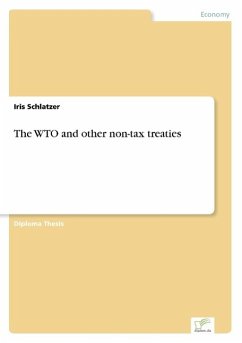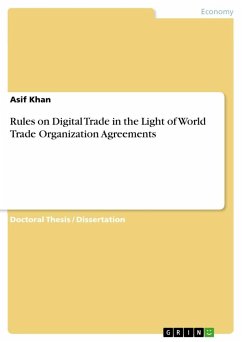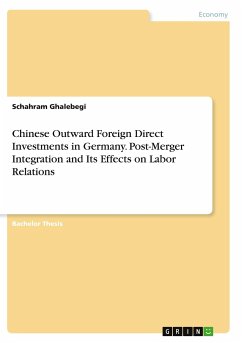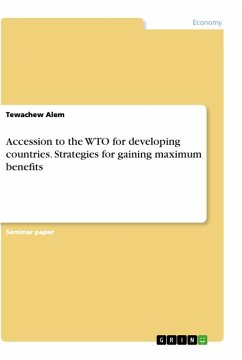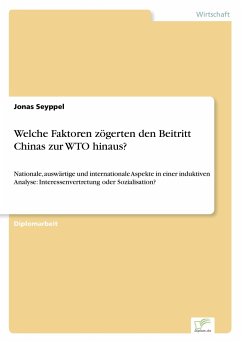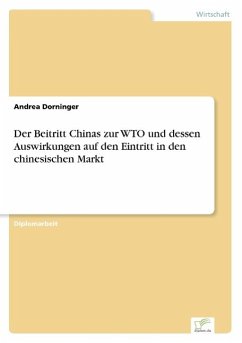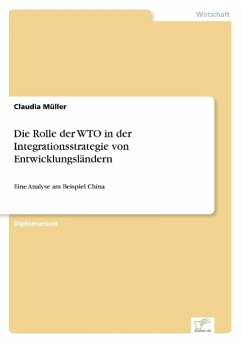Diploma Thesis from the year 2005 in the subject Business economics - Accounting and Taxes, grade: 1,0, Vienna University of Economics and Business (unbekannt, österreichisches und internationales Steuerrecht), language: English, abstract: Inhaltsangabe:Abstract:
The creation of the World Trade Organization (hereafter WTO ) in 1995 was a turning point in the history of international trade. For the first time, an international organization was given the acutely significant mission of enacting and supervising a code of conduct for international trade relations. If areas of misbehavior are identified, interventions can be initiated within the WTO s legal competence. A well-engineered dispute settlement mechanism provides the instrument for ensuring compliance with the standards imposed.
Tax-related distortions of international trade result from both tariff and non-tariff barriers. Taxation has the potential of having obstructive effects on trade a phenomenon which the WTO is very well aware of.
The principal objective of this thesis is to describe the WTO s impact on a country s latitude to design its fiscal measures in light of the effect on foreign trade.
In this respect, the WTO s provisions that relate to taxation are of particular significance. First, after the relevant provisions have been identified, a test will be applied to show the resultant repercussions on taxation. The General Agreement on Tariffs and Trade 1994 (hereafter GATT ) and the subsequent General Agreement on Trade in Services (hereafter GATS ) representing two core agreements of the WTO will be scrutinized in separate chapters. However, to avoid going beyond the scope of this paper, the agreements will only be dealt with in a limited way. Thus, any references to subsidizing will be disregarded. Although the author is very aware of the practical importance of subsidies within the WTO framework, limits had to be drawn.
Primarily, the thesis will give an introduction to the agreements legal status within the European Union and the single European Member States. Focus will be on the impact of the WTO in the respective legal orders. Moreover, the repercussions on individual parties will be addressed as well. Finally, the chapter closes with an analysis of the legal enforceability of the WTO code.
The next two chapters will be dedicated to the GATT and the GATS and their effect on taxation. Great emphasis will be attached to the two major principles embraced therein most-favored-nation treatment (hereafter MFN treatment ) and national treatment.
Chapter 5 will shed light on the relationship between the WTO and bilateral double taxation conventions (hereafter DTCs ). Focus will be on the possibility of conflict and the possible prevalence of one agreement over the other.
Finally, chapter 6 addresses non-tax treaties other than the WTO. The purpose is to show to what extent these treaties include provisions on taxation or carve-out the issue. The chapter s structure reflects the classification of non-tax treaties into general trade treaties and pure investment treaties.
Until now, research on this topic has not been carried out very extensively. Thus, it has been a great challenge to gather and analyze data. Primarily, however, the subject matter has proven to be very intriguing. The thesis at hand therefore intends to provide an in-depth study of the current state of the relationship between the WTO and tax matters. Sporadically, a cautious look and future expectations will be provided. Unfortunately, no one is endowed with the ability to forecast future developments in international trade relations. Only vague ideas about further trends can be projected. Nevertheless, it looks as though the WTO s role in leading international trade relations will become particularly interesting.
Inhaltsverzeichnis:Table of Contents:
1.Preface5
...
Hinweis: Dieser Artikel kann nur an eine deutsche Lieferadresse ausgeliefert werden.
The creation of the World Trade Organization (hereafter WTO ) in 1995 was a turning point in the history of international trade. For the first time, an international organization was given the acutely significant mission of enacting and supervising a code of conduct for international trade relations. If areas of misbehavior are identified, interventions can be initiated within the WTO s legal competence. A well-engineered dispute settlement mechanism provides the instrument for ensuring compliance with the standards imposed.
Tax-related distortions of international trade result from both tariff and non-tariff barriers. Taxation has the potential of having obstructive effects on trade a phenomenon which the WTO is very well aware of.
The principal objective of this thesis is to describe the WTO s impact on a country s latitude to design its fiscal measures in light of the effect on foreign trade.
In this respect, the WTO s provisions that relate to taxation are of particular significance. First, after the relevant provisions have been identified, a test will be applied to show the resultant repercussions on taxation. The General Agreement on Tariffs and Trade 1994 (hereafter GATT ) and the subsequent General Agreement on Trade in Services (hereafter GATS ) representing two core agreements of the WTO will be scrutinized in separate chapters. However, to avoid going beyond the scope of this paper, the agreements will only be dealt with in a limited way. Thus, any references to subsidizing will be disregarded. Although the author is very aware of the practical importance of subsidies within the WTO framework, limits had to be drawn.
Primarily, the thesis will give an introduction to the agreements legal status within the European Union and the single European Member States. Focus will be on the impact of the WTO in the respective legal orders. Moreover, the repercussions on individual parties will be addressed as well. Finally, the chapter closes with an analysis of the legal enforceability of the WTO code.
The next two chapters will be dedicated to the GATT and the GATS and their effect on taxation. Great emphasis will be attached to the two major principles embraced therein most-favored-nation treatment (hereafter MFN treatment ) and national treatment.
Chapter 5 will shed light on the relationship between the WTO and bilateral double taxation conventions (hereafter DTCs ). Focus will be on the possibility of conflict and the possible prevalence of one agreement over the other.
Finally, chapter 6 addresses non-tax treaties other than the WTO. The purpose is to show to what extent these treaties include provisions on taxation or carve-out the issue. The chapter s structure reflects the classification of non-tax treaties into general trade treaties and pure investment treaties.
Until now, research on this topic has not been carried out very extensively. Thus, it has been a great challenge to gather and analyze data. Primarily, however, the subject matter has proven to be very intriguing. The thesis at hand therefore intends to provide an in-depth study of the current state of the relationship between the WTO and tax matters. Sporadically, a cautious look and future expectations will be provided. Unfortunately, no one is endowed with the ability to forecast future developments in international trade relations. Only vague ideas about further trends can be projected. Nevertheless, it looks as though the WTO s role in leading international trade relations will become particularly interesting.
Inhaltsverzeichnis:Table of Contents:
1.Preface5
...
Hinweis: Dieser Artikel kann nur an eine deutsche Lieferadresse ausgeliefert werden.

